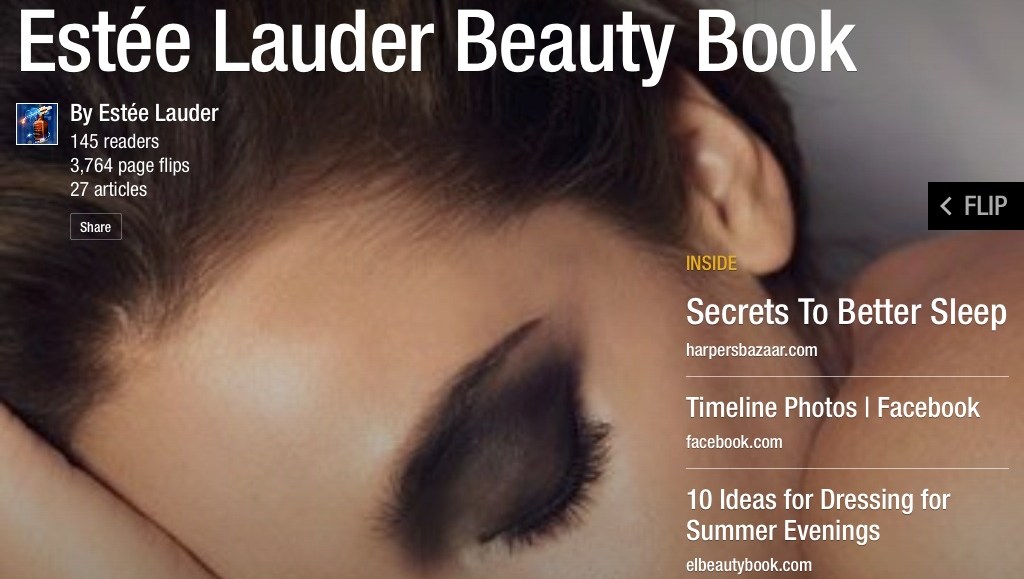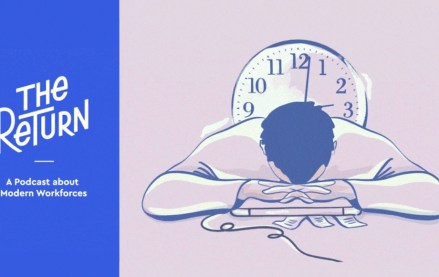
All brands want content these days, opening up opportunities for publishers to step in to offer their expertise.
The latest example is Estée Lauder, along with its media agency, OMD, which turned to Hearst to supply the content for a new digital magazine on the Flipboard app.
Hearst’s custom content unit worked with the brand on developing a slate of both original and recycled beauty and lifestyle content from Hearst pubs Elle, Marie Claire and Harper’s Bazaar in order to create The Estée Lauder Beauty Book. In all, Hearst supplied about 20 pieces of content, which will be used to fill the digital magazine until October. The rest of the content is links to articles from Hearst properties and also other sites.
The Flipboard magazine is a vehicle to promote a revamped Estée Lauder product, Advanced Night Repair, and includes full-page interstitial ads for it throughout the publication, along with links to positive reviews of the product from blogs like XOVain.com and AModelRecommends.com.
“Consumers today are savvy for new information about all sorts of topics across multiple platforms,” said Gustavo Andriani, vp of North America Marketing Estée Lauder, in response to emailed questions. “A media partner like Hearst can address all these overlapping interests, creating the perfect context for us to then talk about new Advanced Night Repair.”
The deal is Hearst’s most ambitious content-driven ad strategy – one that uses several properties, according to Kristine Welker, chief revenue officer for the digital group at Hearst Magazines. The advantage for a media company like Hearst, which was approached by OMD for the program, is that it falls in the “premium” realm, where brands are willing to pay well. (Hearst declined to reveal the financial terms of the deal.)
“It wasn’t an RFP-driven conversation,” said Welker, who is in the midst of moving to a new role at Hearst as publisher of Dr. Oz Magazine. “It’s nice to get outside the RFP process.”
OMD declined to discuss the campaign and referred questions to the client. Estée Lauder didn’t reply at time of publication.
The content has a particular focus on night issues, with several pieces relating to sleep and beauty. The promise of Advanced Nighttime Repair is to improve the skin’s appearance while women are sleeping.
The tricky part is how to create the content without crossing editorial boundaries. The Hearst approach, as described by Welker, is Hearst’s “connected content” unit worked with Estée Lauder on editorial guidelines. It then commissioned pieces using freelancers and some editorial staff members on Hearst’s digital properties. Each Hearst property signed off on the content.
Estée Lauder wasn’t given final approval on the content, according to Hearst, although there was little that was very controversial. The Flipboard publication includes typical fare like “Get Beautiful While You Sleep” and “7 Amazing Snacks That Keep You Energized All Day.”
“The key is getting consumer engagement,” said Elizabeth Shepard, gm of food and home at Hearst. “You have to please the consumers and the advertisers.”
Hearst is driving traffic to the Flipboard magazine on its digital properties. There are also Flipboard ads.
The Estée Lauder Beauty Book is one of several brand magazines launched by Flipboard. Other brands with publications include GE, Capitol One, Lexus and Maybelline.
More in Marketing

With the rise of the chief AI officer, it’s time to examine ‘czar’ culture
Even if it’s a familiar pattern — hot new thing, new C-Suite exec to tackle said thing, a few years go by and that C-Suite position no longer exists as everyone is now doing said thing (or it was a fad that has since faded away) — does it make sense for businesses to continue to appoint new czars with every new trend?

Why Cava’s bid for brand awareness means prioritizing streaming ads
Fast-casual restaurant chain Cava has been in growth mode over the past year and is leaning into streaming ads in an effort to boost brand awareness.

A history of middle manager stress: The Return podcast, season 3, episode 1
In episode one, McKinsey partner Emily Field tells us more about why middle management is critically important to the workforce.





